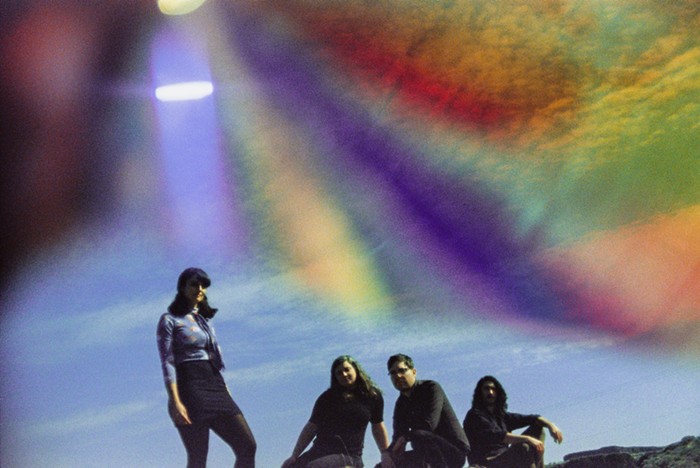On the final line of his song "The Entertainment," Max Tundra (aka British solo artist Ben Jacobs) sings, "Load me in and let me reign/'Cause I was born to entertain." It's a corny boast, and on record—Jacobs singing in a rising, airy voice over muffled drums and trembling synthesizers—it sounds almost like a desperate plea, like the endearingly oddball musician simply isn't capable of doing anything else. (In the song's preceding line, he dreams that his "sequences will outsell Tool," which is unfortunately not bloody likely.)
But watching Jacobs perform—singing like a pitch-perfect Auto Tune–free R&B crooner, fluidly improvising on keys and guitar, jumping from one keyboard to another to melodica to glockenspiel to thumb piano and back, or else jerking his body and flinging his arms about spasmodically, always landing just on time over his own confusingly off-kilter backing beats, doling out droll banter between songs—it is entirely convincing that this man exists for no other purpose than to entertain.
Jacobs grew up taking classical piano lessons but preferred playing TV jingles (live, he warms up and sound-checks with bits of songs by the likes of Van Halen and Foreigner, and one gets the impression that he's drawing from a vast mental catalog of melodies). As a teen, he got a Commodore computer, which he began using to track and record music. And in 1998, he released his first single on esteemed label Warp Records, before releasing two albums on Domino, 2000's Some Best Friend You Turned Out to Be and 2002's critically lauded Mastered by Guy at the Exchange.
He spent six years working on his follow-up, 2008's Parallax Error Beheads You, an outstanding, confounding album that more than justifies the wait. Parallax's songs hyper- actively careen from IDM to electro-funk to rock to pop R&B and back, yet they're expertly held together; once acclimated to its often-dizzying production style and absurdist, referential lyrics, the album reveals some fantastic, unexpected pop gems (one example: "Orphaned," from whose stuttering, microsample pulse emerges a perfect vocal pop coda).
Still, though, six years? What took so long?
"It was a real pain in the ass to record the album, basically," says Jacobs, in an accent that makes even "pain in the ass" sound rather erudite, by phone from a stop in Cleveland on his tour with Junior Boys. "I just wanted to do the most layered, complex record I was capable of, and I work in a very labor- intensive way. And, I mean, obviously, a lot of the six years was spent being too skint to sit in the studio and make music all day, so I'd have to earn my keep and do a succession of quite boring office jobs."
Thus shooting down my notion that Jacobs led the kind of Bohemian artist's lifestyle depicted in the verses of "The Entertainment," leisurely shooting Maya Deren–inspired Super 8 films ("life with a tripod in Manchester beckoned").
Well, what then of the album's finest song, the gauzy, giddy piece of pop genius called "Which Song," which finds Jacobs referencing such disparate subcultural icons as Kevin Blechdom and Agnès B as he frets about romantic anxieties and an uncertain future?
"Well, none of my songs are really about anything specific," says Jacobs. "But if you were to interpret the first verse of 'Which Song,' it's not about Kevin Blechdom herself, but it's about a girl who is a little paranoid that a song I have written is about Kevin Blechdom. So maybe it's a song about a song about Kevin Blechdom.
"Because, in the past, I have been in situations with girls who might have been jealous that I was also involved with other girls. A lot of this album was written when I was kind of breaking up with people and maybe starting up with other people, and it was quite a kind of awkward time, personally."
Still, as emotionally bare as Jacobs gets, he avoids the maudlin in favor of jolting juxtaposition.
"I didn't want to write depressing songs," he says. "Too often when a song deals with a depressing subject, the music itself is also depressing—it might be in a minor key or sound like Jeff Buckley. I wanted the music to be cheerful and upbeat, so there's a kind of tension."
So, too, with both his recorded material and his inimitable live show, Jacobs aims to disarm.
"Anyone who is any good will polarize people, because there's nothing worse than music that's just all right," he says. "I want to make music that makes people think, 'What the fuck?'"
In a just world, such beautifully baffling pop would outsell Tool, and Jacobs would never have to work a day job again. Then maybe he could make his next WTF opus before 2015. ![]()



















